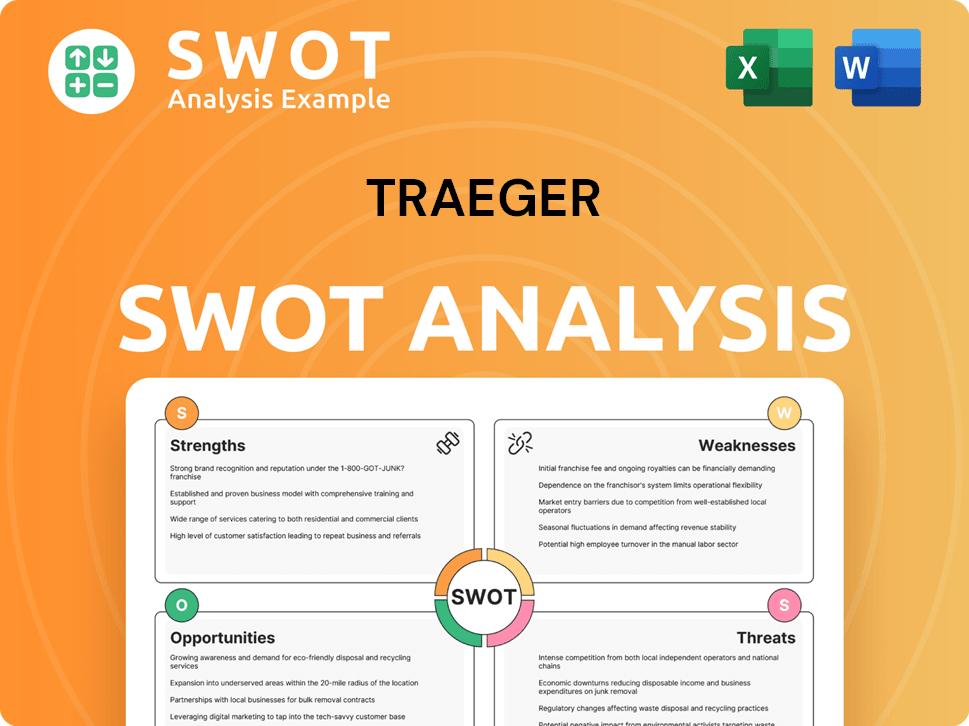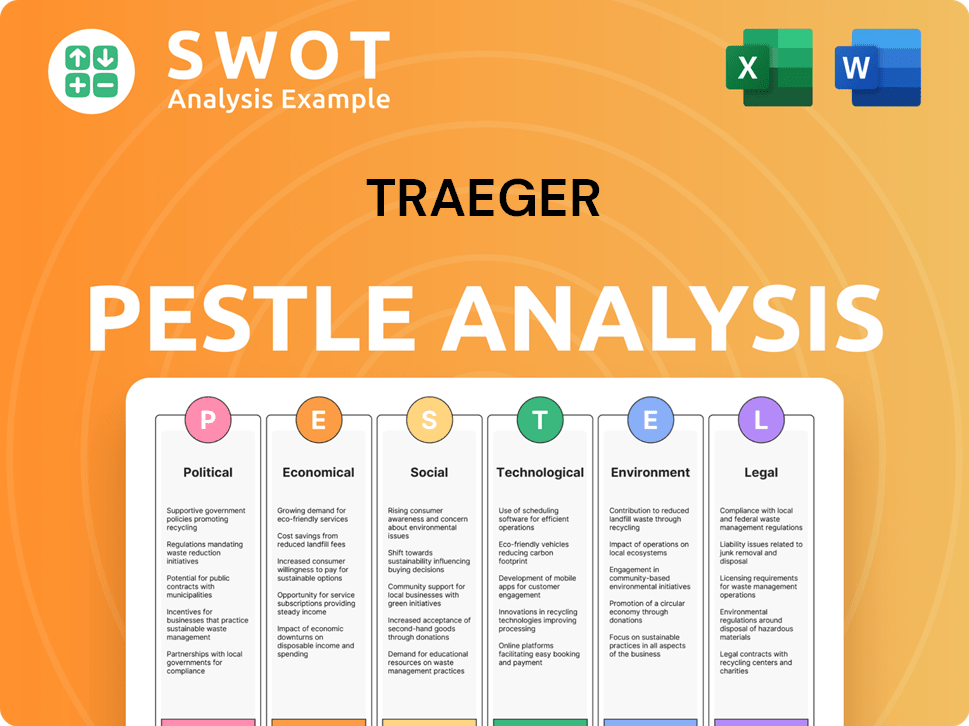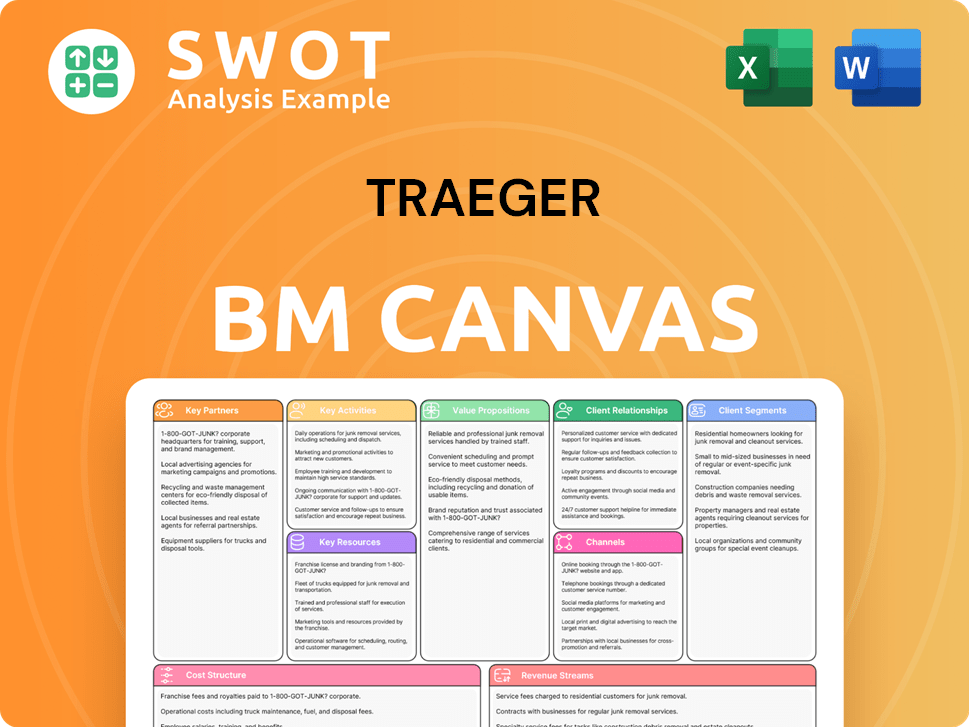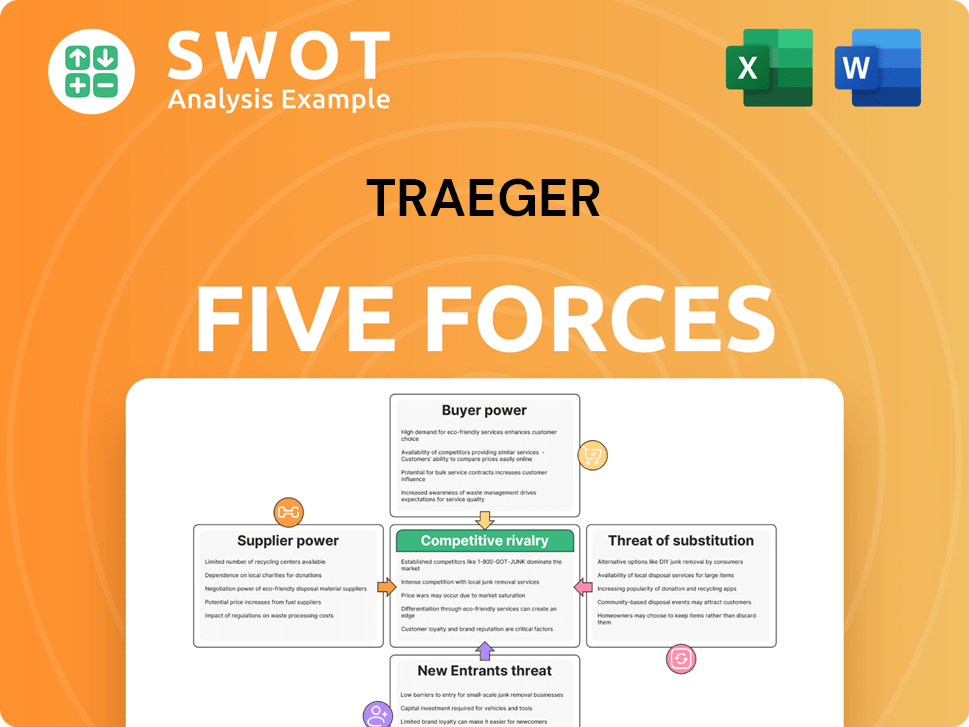Traeger Bundle
Who Really Owns Traeger?
Ever wondered who's truly behind the sizzle of your favorite Traeger SWOT Analysis? Understanding the ownership of a company like Traeger, a leader in the wood-fired grill market, is key to grasping its future. From its humble beginnings to its current market position, the story of Traeger's ownership is a fascinating journey of growth and transformation.

The evolution of Traeger ownership, from its roots as a family-run business to a publicly traded entity, reveals critical insights for investors and enthusiasts alike. Exploring the Traeger company's ownership structure unveils the forces shaping its innovation, market expansion, and financial performance. Discover the key players, including the Traeger parent company and major shareholders, who have influenced the Traeger grill's trajectory and its place in the outdoor cooking industry. This deep dive will also touch upon the Traeger headquarters and the company's history.
Who Founded Traeger?
The
Traeger grill
company, officially known as Traeger, Inc., began its journey in 1987. The founder, Joe Traeger, initially held the reins, establishing the company with a vision for innovative grilling technology. Early on, theTraeger ownership
structure was straightforward, reflecting the typical setup of a privately-held startup.Details about the initial equity split or the exact number of shares at the company's inception are not publicly available. This is due to its private nature during those early years. It's reasonable to assume that early financial backing likely came from personal networks, such as friends, family, or small private loans. There's no disclosed information about any early angel investors who might have played a role in the initial funding phases.
The early focus for the
Traeger company
was on developing and patenting the wood pellet grill. This pioneering product set the stage for the company's future. In 2006, a significant change occurred when Joe Traeger sold the company to Trillium Capital, a private equity firm, for $12 million. This transaction marked a shift inTraeger ownership
, moving it beyond its founder's direct control.Here's a breakdown of the key ownership events in the history of the
Traeger grill
:- 1987: Joe Traeger founds the company, initially holding sole or primary ownership.
- 2006: Trillium Capital, a private equity firm, acquires the company.
Traeger SWOT Analysis
- Complete SWOT Breakdown
- Fully Customizable
- Editable in Excel & Word
- Professional Formatting
- Investor-Ready Format

How Has Traeger’s Ownership Changed Over Time?
The journey of Traeger Grills through various ownership structures highlights its growth and evolution. Initially, the company was founded by Joe Traeger. The ownership transitioned when Trillium Capital acquired it in 2006, followed by AEA Investors in 2014. These shifts were instrumental in shaping the Traeger grill company's strategic direction and market expansion. AEA Investors' ownership was particularly notable for driving significant growth and broadening the product range.
The most significant change occurred on July 29, 2021, when Traeger, Inc. went public on the NYSE under the ticker 'TG'. The initial public offering priced shares at $18.00, raising around $400 million and valuing the company at approximately $2.1 billion. This transition from private equity to a publicly traded entity marked a major milestone, diversifying the shareholder base and increasing regulatory oversight. This change also brought increased regulatory scrutiny and reporting requirements, influencing company strategy and governance through greater transparency and accountability to a wider investor base.
| Ownership Phase | Key Event | Impact |
|---|---|---|
| Founding | Joe Traeger establishes the company | Initial ownership and brand creation. |
| 2006 | Acquisition by Trillium Capital | Shift to private equity ownership. |
| 2014 | Acquisition by AEA Investors | Accelerated growth and market expansion. |
| July 2021 | Initial Public Offering (IPO) | Transition to public ownership; increased investor base. |
As of early 2025, the Traeger Grills ownership structure includes significant institutional investors. Capital World Investors, The Vanguard Group, Inc., and BlackRock Inc. are among the top holders, reflecting confidence in the company's market position. The shift to public ownership has brought increased transparency and accountability, influencing the company's strategic decisions and governance. To understand more about the company's financial performance, consider exploring the Revenue Streams & Business Model of Traeger.
The evolution of Traeger ownership reflects its growth from a private company to a publicly traded entity.
- The IPO in 2021 was a pivotal moment, bringing in a diverse range of investors.
- Institutional investors now hold significant stakes, indicating confidence in the Traeger company's future.
- Understanding the Traeger Grills ownership structure is crucial for investors and stakeholders.
Traeger PESTLE Analysis
- Covers All 6 PESTLE Categories
- No Research Needed – Save Hours of Work
- Built by Experts, Trusted by Consultants
- Instant Download, Ready to Use
- 100% Editable, Fully Customizable

Who Sits on Traeger’s Board?
The current Board of Directors for Traeger, Inc. includes a blend of representatives from major shareholders, independent directors, and company executives. This structure is designed to balance the interests of various stakeholders. As of early 2025, the board typically comprises members with expertise in consumer goods, finance, and marketing, offering a diverse range of skills. While specific board members directly representing major institutional shareholders like Vanguard or BlackRock aren't always explicitly named, the board's composition is influenced by the need to attract and retain institutional investment. Individuals with historical ties to private equity firms that previously owned Traeger might also hold board seats, though their roles would be as independent directors or based on their expertise.
The board's decisions are primarily guided by the collective interests of its diverse shareholder base and the pursuit of long-term company growth and profitability. The Traeger ownership structure and the board's composition are crucial for understanding the company's strategic direction and financial health. Understanding the Traeger grill company's leadership is essential for investors and stakeholders alike. For more insights into the Traeger company and its consumer base, you can explore the Target Market of Traeger.
| Board Member | Title | Background |
|---|---|---|
| To be determined | CEO | Industry experience |
| To be determined | Director | Financial expertise |
| To be determined | Director | Consumer goods experience |
Traeger, Inc. operates with a one-share-one-vote structure for its common stock, which is common for publicly traded companies. There are no publicly disclosed special voting rights, dual-class shares, or golden shares that would grant outsized control to any single individual or entity. This structure generally promotes a more equitable distribution of voting power among shareholders. There have been no major public proxy battles or activist investor campaigns reported in recent years that have significantly shaped decision-making within the company, indicating a relatively stable governance environment.
The Board of Directors at Traeger, Inc. is structured to balance stakeholder interests, with a mix of shareholder representatives, independent directors, and company executives.
- The company follows a one-share-one-vote structure, promoting equitable voting power.
- Board decisions are focused on long-term growth and profitability for all shareholders.
- The board includes individuals with diverse backgrounds in consumer goods, finance, and marketing.
- There are no significant activist investor campaigns reported, indicating a stable governance environment.
Traeger Business Model Canvas
- Complete 9-Block Business Model Canvas
- Effortlessly Communicate Your Business Strategy
- Investor-Ready BMC Format
- 100% Editable and Customizable
- Clear and Structured Layout

What Recent Changes Have Shaped Traeger’s Ownership Landscape?
Over the past few years, the ownership structure of the Traeger company has evolved significantly. Following its initial public offering (IPO) in 2021, Traeger has operated as a publicly traded entity. As of early 2025, there have been no major share buybacks or secondary offerings that have dramatically altered the ownership landscape. Strategic partnerships and smaller acquisitions are explored by the Traeger company to enhance product offerings and market reach; however, mergers and acquisitions have not been a primary focus in terms of significantly altering Traeger's core ownership.
A notable trend impacting Traeger, mirroring the broader market, is the increasing presence of institutional investors. A substantial portion of Traeger's shares are now held by large asset management firms, mutual funds, and index funds. This shift indicates a mature ownership phase, where liquidity and broad market access are key priorities. The founder, Joe Traeger, sold the company before the IPO, so his direct ownership is no longer a central factor in current discussions about Traeger's ownership. For further insights into the company's strategic direction, consider reading about the Growth Strategy of Traeger.
| Metric | Value (Early 2025) | Source |
|---|---|---|
| Stock Price | Approximately $5-$10 per share (varies) | Financial News Outlets |
| Market Capitalization | Fluctuates, typically between $500 million - $1 billion | Financial News Outlets |
| Institutional Ownership | Approximately 70-80% of outstanding shares | Financial filings |
Public statements from the company and analysts in 2024 and early 2025 have emphasized growth strategies, product innovation, and market expansion rather than significant ownership changes. Traeger's focus remains on solidifying its market position in the outdoor cooking industry, leveraging its brand recognition and product innovation to increase shareholder value. The company's headquarters is located in Salt Lake City, Utah.
IPO in 2021 marked a shift to public ownership.
Increasing institutional ownership is a dominant pattern.
Focus on growth and market expansion.
Joe Traeger is no longer a primary owner.
Traeger Porter's Five Forces Analysis
- Covers All 5 Competitive Forces in Detail
- Structured for Consultants, Students, and Founders
- 100% Editable in Microsoft Word & Excel
- Instant Digital Download – Use Immediately
- Compatible with Mac & PC – Fully Unlocked

Related Blogs
- What are Mission Vision & Core Values of Traeger Company?
- What is Competitive Landscape of Traeger Company?
- What is Growth Strategy and Future Prospects of Traeger Company?
- How Does Traeger Company Work?
- What is Sales and Marketing Strategy of Traeger Company?
- What is Brief History of Traeger Company?
- What is Customer Demographics and Target Market of Traeger Company?
Disclaimer
All information, articles, and product details provided on this website are for general informational and educational purposes only. We do not claim any ownership over, nor do we intend to infringe upon, any trademarks, copyrights, logos, brand names, or other intellectual property mentioned or depicted on this site. Such intellectual property remains the property of its respective owners, and any references here are made solely for identification or informational purposes, without implying any affiliation, endorsement, or partnership.
We make no representations or warranties, express or implied, regarding the accuracy, completeness, or suitability of any content or products presented. Nothing on this website should be construed as legal, tax, investment, financial, medical, or other professional advice. In addition, no part of this site—including articles or product references—constitutes a solicitation, recommendation, endorsement, advertisement, or offer to buy or sell any securities, franchises, or other financial instruments, particularly in jurisdictions where such activity would be unlawful.
All content is of a general nature and may not address the specific circumstances of any individual or entity. It is not a substitute for professional advice or services. Any actions you take based on the information provided here are strictly at your own risk. You accept full responsibility for any decisions or outcomes arising from your use of this website and agree to release us from any liability in connection with your use of, or reliance upon, the content or products found herein.